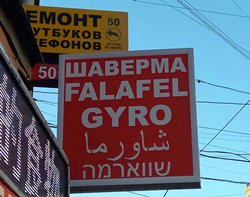Linguasnapp allows users to collect and upload images of signs in different languages to a digital archive that is accessible to the public.
It was developed by the Multilingual Manchester research unit and the University’s Research IT group in 2016, and has since been used by researchers to map the use of different languages in Manchester and to inform planning and provisions in the commercial and public sectors.
Schools use the LinguaSnapp archive to raise pupils’ awareness of local communities, and of the city’s language and cultural diversity. Bespoke versions of the app have also been released for Jerusalem and Melbourne.
The Saint Petersburg edition has been produced with the Higher School for Economics and the European University of Saint Petersburg, and is being launched at an international conference on the study of linguistic landscapes in multilingual cities.
“Manchester’s language diversity has become part of the city’s identity,” said Professor Yaron Matras, founder of The University of Manchester’s Multilingual Manchester unit and initiator of the app. “Now, it is also a theme that allows us to connect with other cities in the world.”
“In addition to celebrating the shared values of multiculturalism, this vital UK-Russia collaboration is rebuilding trust between our peoples just as diplomatic relations have reached crisis point,” said Professor Stephen Hutchings, a Russia specialist and member of Multilingual Manchester. “It reminds us that information technology is a force for good as well as a tool of warfare.”
Andrew Jerrison of the University’s Research IT team, who designed the app, said: ‘LinguaSnapp is an exciting example of the opportunities that we have to engage with researchers in the arts and humanities and create new tools that appeal to students and the wider public, both nationally and internationally. Research IT contributed Research Software Engineer expertise in requirements gathering, software design and software development. We worked closely with the Multilingual Manchester team to produce bespoke mobile and web applications, and continue to support the software.’
If you are interested in utilising the skills of our Research Software Engineers, get in touch for a chat about how they can contribute to your research project.

